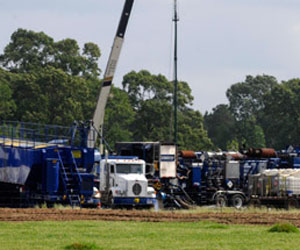Is Halliburton injecting diesel fuel into your drinking water? According to documents from a congressional investigation released yesterday, the oil and gas giant in 2008 admitted to using more than 807,000 gallons of diesel-based chemicals in fluids used for hydraulic fracturing, or fracking, a method that uses a high-pressure blast of chemical compounds, sand, and water to fracture rock and access natural gas reserves. In 2005, the industry successfully lobbied to have fracking fluids exempted from the Safe Drinking Water Act. Now the fear is that these toxic chemicals may be leaching into wells and contaminating the water you drink.
In response to an investigation by the House Oversight and Government Reform Committee released yesterday, Halliburton and BJ Services, another major oil field services company, reported using other toxic chemicals like benzene, toluene, ethylbenzene, and xylene in fracking fluids. Even though the natural gas industry is exempt from the Safe Drinking Water Act, it’s still required to limit the amount of diesel used in fracturing, under a December 2003 agreement with the Environmental Protection Agency. Halliburton and BJ Services appear to have violated the agreement, according to yesterday’s disclosure.
A report released last month by the Environmental Working Group found that single wells have been found to contain enough benzene and other toxins to contaminate the amount of water New York state uses in a day. And natural gas use is only set to rise if there’s a climate bill—it emits 30 percent less carbon dioxide than oil and 45 percent less than coal.
The Energy and Commerce Committee yesterday announced a wider probe of the controversial process. And Colorado Rep. Diane Degette (D) is sponsoring House legislation that would bring fracking materials back the Safe Drinking Water Act and require companies to make public the chemicals they use. But the industry has, for the most part, battled to evade disclosure requirements—arguing that the compounds are proprietary information that could compromise what is becoming an increasingly lucrative business.
















